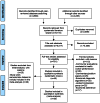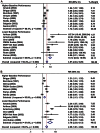Does integrated management of childhood illness (IMCI) training improve the skills of health workers? A systematic review and meta-analysis
- PMID: 23776599
- PMCID: PMC3680429
- DOI: 10.1371/journal.pone.0066030
Does integrated management of childhood illness (IMCI) training improve the skills of health workers? A systematic review and meta-analysis
Abstract
Background: An estimated 6.9 million children die annually in low and middle-income countries because of treatable illneses including pneumonia, diarrhea, and malaria. To reduce morbidity and mortality, the Integrated Management of Childhood Illness strategy was developed, which included a component to strengthen the skills of health workers in identifying and managing these conditions. A systematic review and meta-analysis were conducted to determine whether IMCI training actually improves performance.
Methods: Database searches of CIHAHL, CENTRAL, EMBASE, Global Health, Medline, Ovid Healthstar, and PubMed were performed from 1990 to February 2013, and supplemented with grey literature searches and reviews of bibliographies. Studies were included if they compared the performance of IMCI and non-IMCI health workers in illness classification, prescription of medications, vaccinations, and counseling on nutrition and admistration of oral therapies. Dersminion-Laird random effect models were used to summarize the effect estimates.
Results: The systematic review and meta-analysis included 46 and 26 studies, respectively. Four cluster-randomized controlled trials, seven pre-post studies, and 15 cross-sectional studies were included. Findings were heterogeneous across performance domains with evidence of effect modification by health worker performance at baseline. Overall, IMCI-trained workers were more likely to correctly classify illnesses (RR = 1.93, 95% CI: 1.66-2.24). Studies of workers with lower baseline performance showed greater improvements in prescribing medications (RR = 3.08, 95% CI: 2.04-4.66), vaccinating children (RR = 3.45, 95% CI: 1.49-8.01), and counseling families on adequate nutrition (RR = 10.12, 95% CI: 6.03-16.99) and administering oral therapies (RR = 3.76, 95% CI: 2.30-6.13). Trends toward greater training benefits were observed in studies that were conducted in lower resource settings and reported greater supervision.
Conclusion: Findings suggest that IMCI training improves health worker performance. However, these estimates need to be interpreted cautiously given the observational nature of the studies and presence of heterogeneity.
Conflict of interest statement
Figures



References
-
- UNICEF (2011) Levels and trends of child mortality: Report 2011. Esitmates developmed by the UN inter-agency group for child mortality estimation. URL: http://www.unicef.org/media/files/Child_Mortality_Report_2011_Final.pdf. (Accessed 12 November 2012).
-
- Liu L, Johnson HL, Cousens S, Perin J, Scott S, et al. (2012) Global, regional, and national causes of child mortality: an updated systematic analysis for 2010 with time trends since 2000. The Lancet 379: 2151–2161. - PubMed
-
- Chopra M, Mason E, Borrazzo J, Campbell H, Rudan I, et al.. (2013) Ending of preventable deaths from pneumonia and diarrhoea: An achievable goal. The Lancet. - PubMed
-
- Tulloch J (1999) Integrated approach to child health in developing countries. The Lancet: SII16–SII20. - PubMed
Publication types
MeSH terms
Grants and funding
LinkOut - more resources
Full Text Sources
Other Literature Sources

